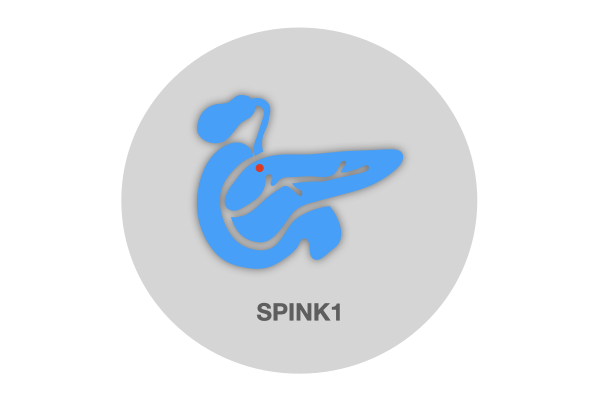SPINK1 Gene Mutation & Pancreatic Cancer

Introduction
The serine protease inhibitor Kazal type 1 (SPINK1) is a potent anti-protease present in the cytoplasm of pancreatic cells, where its primary role is to prevent the auto-digestion of the gland by inactivating the intra-pancreatic trypsin enzyme. The SPINK1 gene codes for this protein, and a homozygous c.101A>G (N34S) mutation identified in 2000, in the SPINK1 gene results in the alteration of SPINK1 protein pancreatitis. It is a rare form of pancreatitis caused by genetic mutation with an overall worldwide frequency of 1-3%. However, the association between the SPINK1 gene and pancreatic cancer has been controversial among researchers and clinicians. There is conflicting evidence available in the literature. This article summarizes some evidence from Nucleati Germline Cancer Evidence Base, discussing the association between the SPINK1 gene and pancreatic cancer.
Supporting Evidence
The first case of pancreatic cancer and pancreatitis in a 44-year-old female patient with SPINK1 gene mutation was reported in 2004. The elder sister of that patient was also diagnosed with chronic pancreatitis and the SPINK1 gene mutation, while her parents and brother were carriers of this mutation. Later in 2016, malignant pancreatic cancer was reported in a 29 years old female with homozygous SPINK1 gene mutation. In 2019, a study of 209 European patients with SPINK1 gene mutation identified pancreatic cancer in only 3.3% of the total patients.
Refuting Evidence
Contrary to the evidence mentioned above, an observational cohort study conducted in 2014 on 121 pancreatic cancer German patients revealed that mutation in the SPINK1 gene and other genes was not significantly associated with pancreatic cancer. Similarly, a recent prospective observational study conducted on a cohort of 965 Chinese patients with chronic pancreatitis suggested that there was no elevated risk of pancreatic cancer in chronic pancreatitis patients with SPINK1 gene mutation.
Conclusion
Conflicting evidence of SPINK gene mutation and pancreatic cancer exists in the literature, with recent studies refuting evidence of SPINK1 gene mutation and pancreatic cancer. Further investigations are needed to validate this association between SPINK1 gene mutation and pancreatic cancer.
References
- Frossard, J. L., & Morris, M. A. (2017). Two SPINK1 mutations induce early-onset severe chronic pancreatitis. Case reports in gastroenterology, 11(1), 85-88.
- Masamune, A., Mizutamari, H., Kume, K., Asakura, T., Satoh, K., & Shimosegawa, T. (2004). Hereditary pancreatitis as the premalignant disease: a Japanese case of pancreatic cancer involving the SPINK1 gene mutation N34S. Pancreas, 28(3), 305-310.
- Moran, R. A., Klapheke, R., Jalaly, N. Y., Makary, M. A., Hirose, K., Goggins, M., ... & Singh, V. K. (2016). Metastatic pancreatic adenocarcinoma associated with chronic calcific pancreatitis and a heterozygous SPINK1 N34S mutation. Pancreatology, 16(5), 869-872.
- Muller, N., Sarantitis, I., Rouanet, M., de Mestier, L., Halloran, C., Greenhalf, W., ... & Rebours, V. (2019). Natural history of SPINK1 germline mutation related-pancreatitis. EBioMedicine, 48, 581-591.
- Ru, N., Wu, S. Y., Wang, L., Zhu, J. H., Xu, X. N., Guo, J. Y., ... & Liao, Z. (2021). SPINK1 mutations and risk of pancreatic cancer in a Chinese cohort. Pancreatology, 21(5), 848-853.
- Schubert, S., Traub, F., Brakensiek, K., von Kopylow, K., Marohn, B., Maelzer, M., ... & Stuhrmann, M. (2014). CFTR, SPINK1, PRSS1, and CTRC mutations are not associated with pancreatic cancer in German patients. Pancreas, 43(7), 1078-1082.